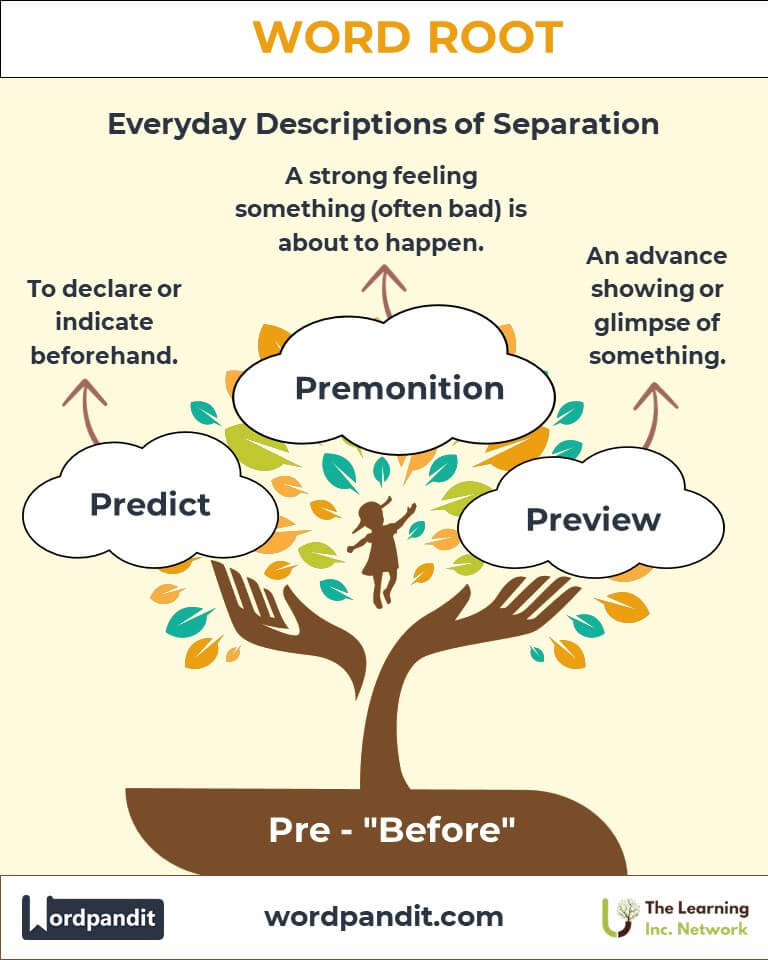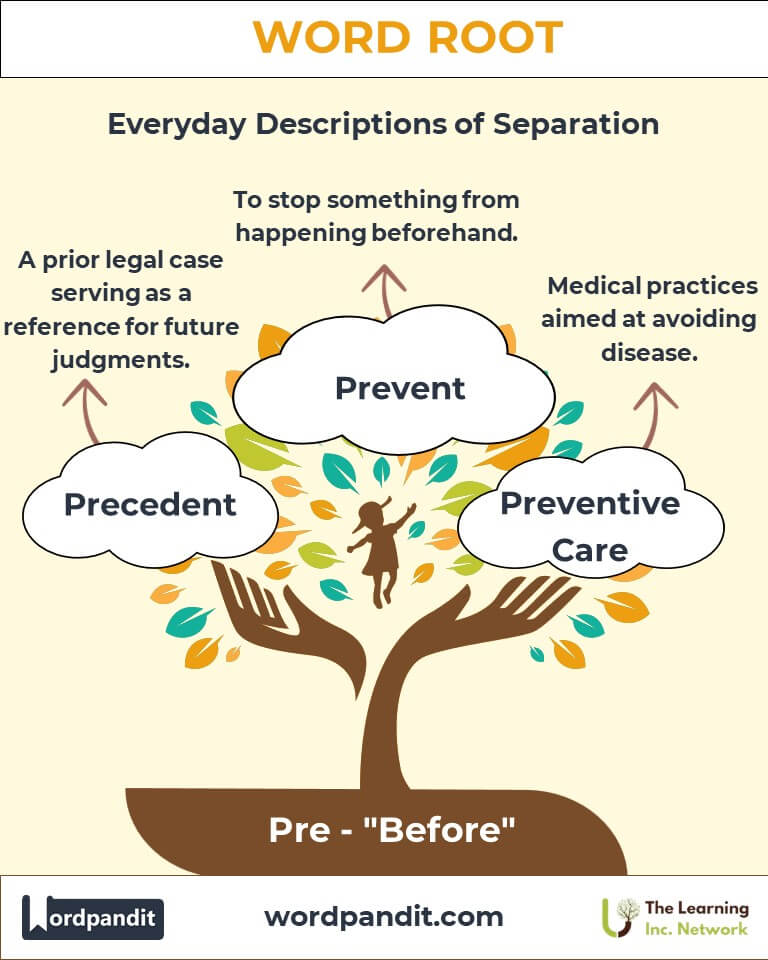Pre: The Root of Foresight and Priority in Language
Discover the dynamic versatility of the root "pre," originating from Latin, meaning "before." Words like "predict" and "precede" highlight the significance of foresight and precedence, illustrating how this root enriches everyday language and specialized fields alike.

Table of Contents
- Introduction: The Essence of "Pre-"
- Etymology and Historical Journey
- Mnemonic: Unlocking the Power of "Pre-"
- Common "Pre-" Related Terms
- "Pre-" Through Time
- "Pre-" in Specialized Fields
- Illustrative Story: "Pre-" in Action
- Cultural Significance of "Pre-"
- The "Pre-" Family Tree
- FAQs about the "Pre-" Word Root
- Test Your Knowledge: "Pre-" Mastery Quiz
- Conclusion: The Enduring Relevance of "Pre-"
1. Introduction: The Essence of "Pre-"
The prefix "pre-" (pronounced pree) conveys the idea of "before" in time, place, or order. It shapes words that reflect anticipation, preparation, or priority. Found in terms like predict (to say beforehand) and precede (to come before), "pre-" is integral to expressions of planning, foresight, and sequence, spanning diverse disciplines.

2. Etymology and Historical Journey
The root "pre-" derives from the Latin prae, meaning "before" or "in front of." It entered English through Old French, maintaining its sense of temporal and spatial precedence. Over centuries, "pre-" has been adopted in various contexts, from philosophical concepts to scientific terminology, reflecting its universal utility.
3. Mnemonic: Unlocking the Power of "Pre-"
Imagine a stopwatch counting down seconds before a race begins, symbolizing preparation and anticipation. This image captures the essence of "pre-"—always ahead of the action.
Mnemonic Device: "Pre- predicts the path, prepares the plan, and precedes the present."
4. Common "Pre-" Related Terms
- Predict (pri-dikt)
- Definition: To declare or indicate beforehand.
- Example: "The meteorologist predicted heavy rainfall this weekend."
- Precede (pri-seed)
- Definition: To come before something in time or order.
- Example: "A short speech preceded the award ceremony."
- Preview (pree-vyoo)
- Definition: An advance showing or glimpse of something.
- Example: "The director offered a sneak preview of the film."
- Prevent (pri-vent)
- Definition: To stop something from happening beforehand.
- Example: "Wearing helmets helps prevent serious head injuries."
- Premonition (pree-muh-nish-un)
- Definition: A strong feeling something (often bad) is about to happen.
- Example: "She had a premonition of the upcoming storm."
5. "Pre-" Through Time
Premeditation (पूर्वविचार)
Evolution: Initially tied to legal contexts, premeditation referred to prior planning, particularly in criminal actions. Today, it retains its association with forethought.
Precedent (मिसाल)
Shift: Originating in legal traditions, this term has expanded into broader fields, signifying a guiding prior example.
6. "Pre-" in Specialized Fields
Law (कानून)
- Precedent (मिसाल): A prior legal case serving as a reference for future judgments.
- Significance (महत्व): It ensures consistency and fairness in rulings.
Medicine (चिकित्सा)
- Preventive Care (रोकथाम देखभाल): Medical practices aimed at avoiding disease.
- Example (उदाहरण): Vaccinations are a cornerstone of preventive healthcare.
Technology (प्रौद्योगिकी)
- Preprocessing (पूर्व-संसाधन): Preparing data before analysis in computing.
- Application (अनुप्रयोग): Critical in fields like machine learning and AI.
Education (शिक्षा)
- Preschool (पूर्व विद्यालय): Early childhood education preceding primary school.
- Impact (प्रभाव): Lays foundational skills for lifelong learning.
7. Illustrative Story: "Pre-" in Action
Lila, an ambitious student, meticulously prepared for her college entrance exams. Every morning, she reviewed her notes, anticipating potential questions. Her premonition about the essay topic proved accurate, and her foresight paid off. Thanks to her preparation, she excelled, demonstrating how "pre-" embodies planning and success.
8. Cultural Significance of "Pre-"
From age-old proverbs like "Prevention is better than cure" (रोकथाम इलाज से बेहतर है) to practices emphasizing planning and foresight, "pre-" is deeply woven into cultural and societal values. It reflects humanity’s drive to anticipate and prepare for the future.

9. The "Pre-" Family Tree
- Ante- (Latin: "before") (एंटे-: पहले)
- Example (उदाहरण): Antecedent (पूर्ववर्ती) – Something existing before another.
- Pro- (Latin: "forward") (प्रो-: आगे)
- Example (उदाहरण): Progress (प्रगति) – Movement forward in time or development.
- Fore- (Old English: "before") (फोर-: पहले)
- Example (उदाहरण): Forewarn (पूर्वचेतावनी) – To warn beforehand.

FAQs About the "Pre-" Word Root
Q: What does "pre-" mean?
A: The prefix "pre-" comes from Latin and means "before." It conveys the idea of being earlier in time, order, or position, as seen in words like "precede" (to come before) and "predict" (to say beforehand). Its consistent meaning makes it easy to identify and understand in various contexts.
Q: How is "pre-" different from "pro-"?
A: While both prefixes come from Latin, they differ in meaning:
- Pre- means "before," focusing on earlier time or sequence (e.g., "preheat," "premonition").
- Pro- means "forward" or "in favor of," emphasizing progress or support (e.g., "proceed," "promote").
Q: What is the difference between "precede" and "proceed"?
A: "Precede" means to happen or come before in time or order, as in "The opening speech preceded the event." "Proceed" means to continue or go forward, as in "After the pause, we proceeded with the presentation." Their roots highlight different actions: one occurs earlier, while the other moves forward.
Q: Why is "pre-" important in medical terminology?
A: In medicine, "pre-" is often used to indicate prevention, preparation, or early stages. For instance:
- Preventive care: Medical actions taken before illness occurs (e.g., vaccinations).
- Premature birth: Birth occurring before the full term of pregnancy.
The prefix emphasizes early intervention or preparation, which is vital for effective care.
Test Your Knowledge: "Pre-" Mastery Quiz
1. What does "pre-" mean?
2. Which word means to stop something before it happens?
3. What is the purpose of a "preview"?
4. Which field uses "precedent" frequently?
5. What is the meaning of "premonition"?
12. Conclusion: The Enduring Relevance of "Pre-"
The root "pre-" underscores humanity's penchant for planning and foresight, manifesting in language, law, medicine, and beyond. By embracing its essence, we cultivate anticipation and preparedness in all aspects of life.
Explore the power of "pre-" and let it guide your journey forward!














